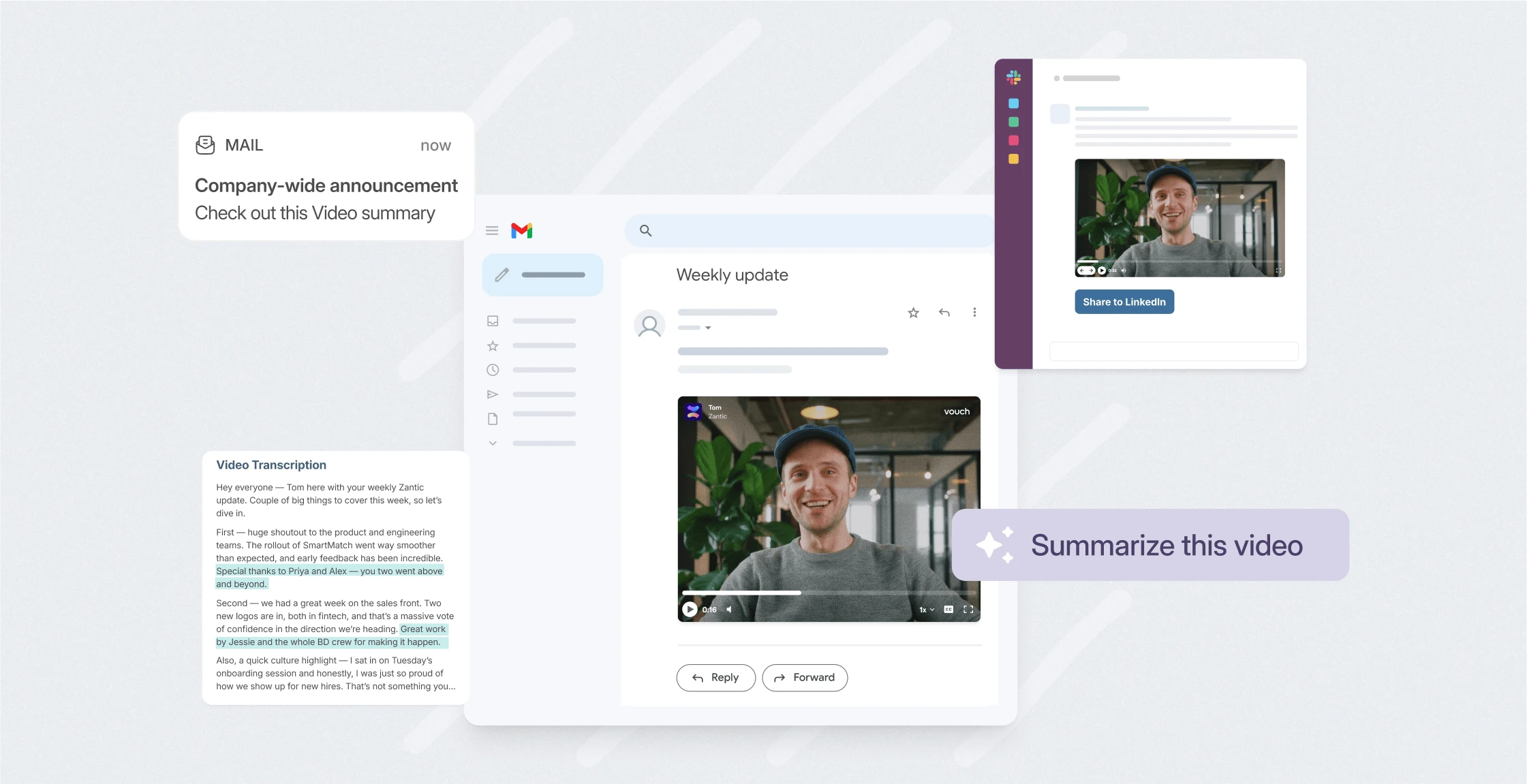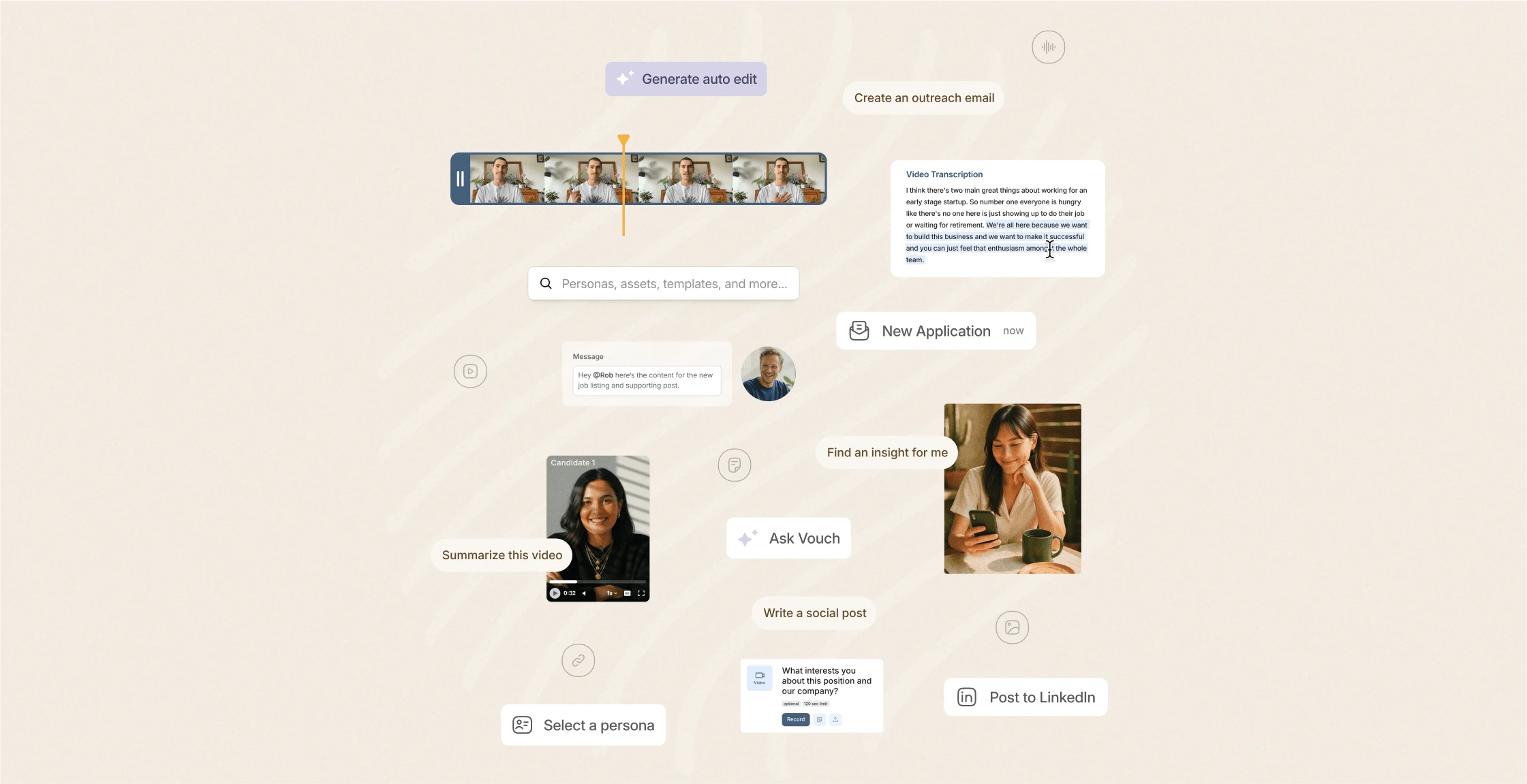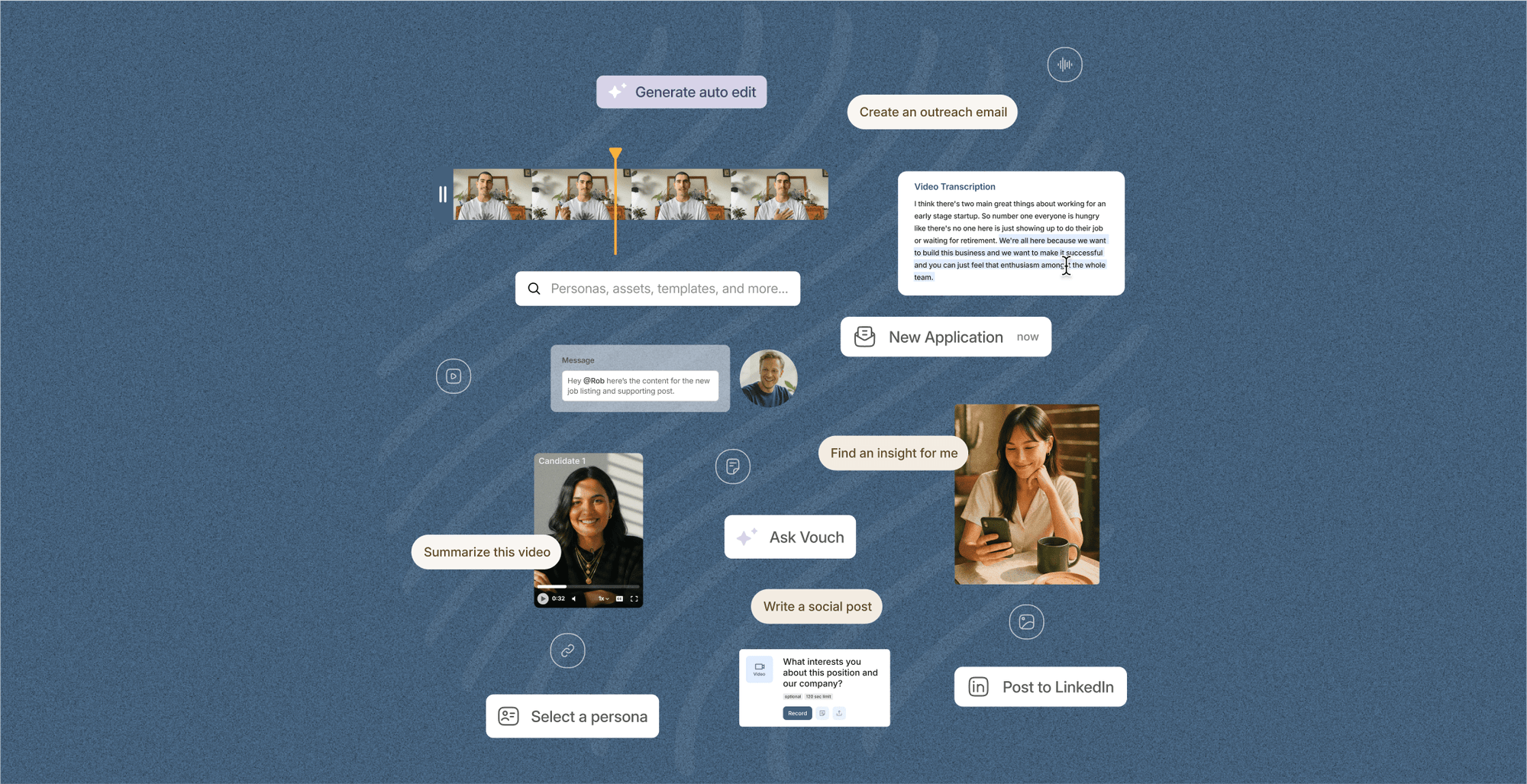An effective recruitment strategy, and indeed a successful business strategy, hinges on two critical elements: an employer brand and an employee value proposition (EVP). Though often used interchangeably, these terms have distinct meanings.
Employer Brand: This refers to the external reputation and image of a company as a desirable place to work.
Employee Value Proposition (EVP): This represents the value employees receive from the organization and the value they contribute in return.
So, let's get started.
Employer Brand vs. Employee Value Proposition, The Key Takeaways
- Both employer branding and EVP are essential for attracting and retaining top talent.
- Developing an EVP requires thorough research and alignment with company values.
- Tools like Vouch video can simplify and enhance your employer branding efforts.
What Is The Role of Your Employer Brand?
When it comes to your employer brand vs employee value proposition, your employer brand component is what shapes your company’s reputation as an "employer of choice."
Here are key aspects of a strong employer brand:
- Attracting Talent: A strong brand attracts top candidates who align with your values and aspirations. LinkedIn reports a 50% increase in qualified applicants for companies with a strong employer brand.
- Enhancing Retention: A defined employer brand fosters a sense of belonging, leading to higher job satisfaction and lower turnover rates.
- Improving Candidate Quality: Candidates attracted by your brand are likely to fit better culturally, leading to higher performance and lower hiring costs.
- Reducing Recruitment Costs: A positive brand reduces cost per hire by generating organic interest and leveraging employee referrals.
- Building Trust and Reputation: It enhances your overall company reputation, building trust with potential candidates, employees, and customers.
- Supporting Diversity and Inclusion: A clear brand that emphasizes diversity can attract a more diverse workforce.
- Enhancing Engagement: A brand that reflects company values increases employee engagement, leading to higher productivity and better customer service.
- Differentiating in the Market: A strong brand sets you apart in a competitive job market.
- Supporting Business Goals: Aligning your brand with business goals ensures your talent strategy is cohesive.
- Crisis Management: A strong brand helps maintain morale and attract supportive candidates during crises.
60% of in-house recruiting pros predict their employer branding investments will increase this year. Source LinkedIn.
The AI-enabled workspace for talent teams.
- Unified workspace for talent teams
- Accelerate hiring with AI tools
- Auto-generate polished hiring and employer brand content
- Easily repurpose assets across all channel
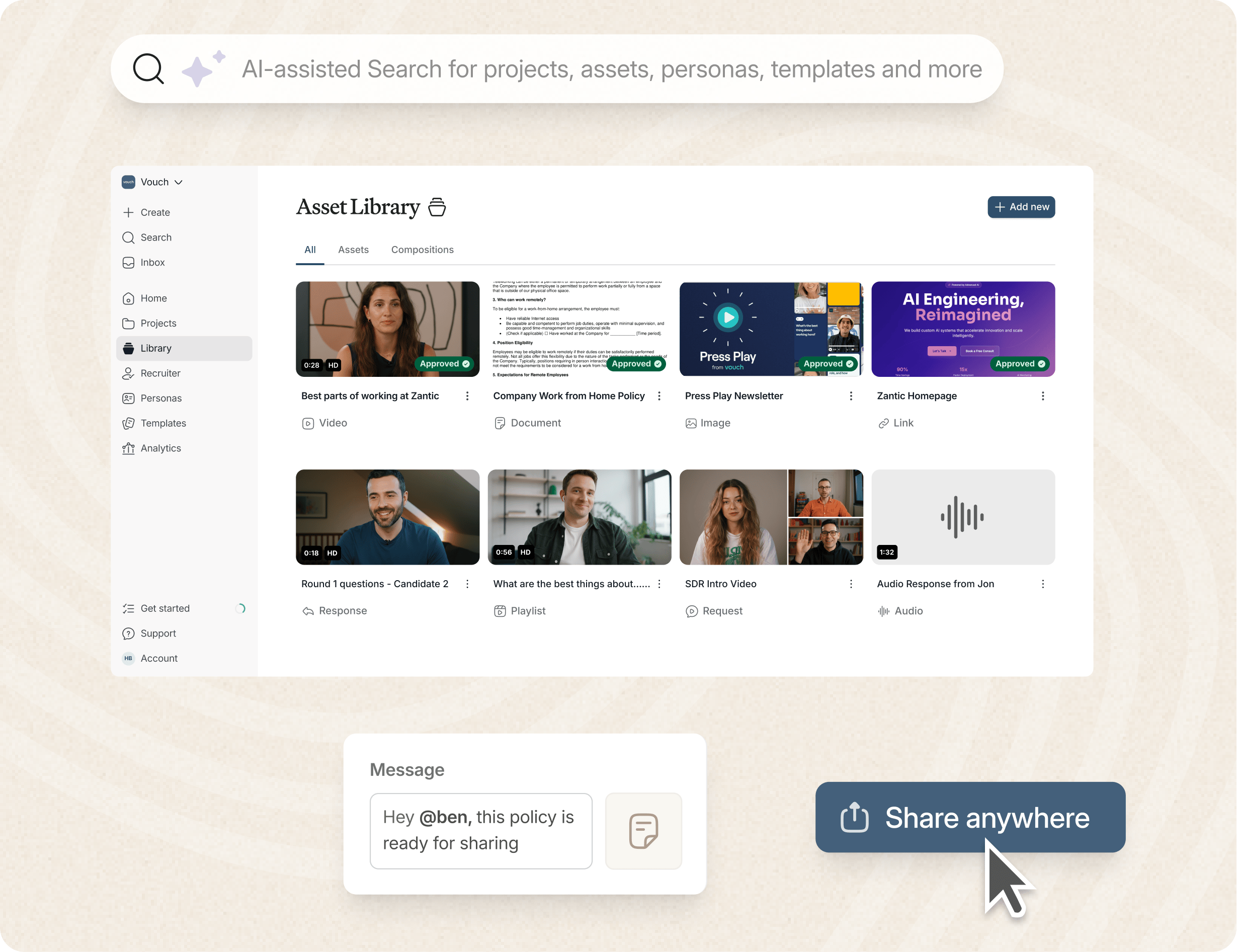
What Is The Importance of Your Employee Value Propositions (EVPs)?
An effective EVP can significantly reduce employee turnover and increase new hire commitment. It communicates the value employees receive from your organization and what they are expected to contribute. EVPs encompass tangible benefits and intangible factors like team spirit and meaningful work.
For example, did you know that according to LinkedIn the #1 obstacle candidates experience when searching for a job is not knowing what it’s like to work at an organization. This shows just important your employer brand and employee value propositions are.
How Do You Develop Your EVPs?
Like your employer brand, creating a strong EVP involves several steps.
Remember it's not your employer brand vs employee value proposition that matters, it's about making them work seamlessly together.
1. Conduct Internal Research
- Employee Surveys: Gather insights on what employees value most.
- Focus Groups: Gain qualitative insights from different departments.
- Exit Interviews: Identify reasons for employee departures and areas for improvement.
2. Analyze External Perceptions
- Employer Review Sites: Monitor reviews to understand how employees view your company.
- Competitor Analysis: Research competitors' EVPs to find gaps and opportunities.
3. Identify Key Themes
- Workplace Culture: Highlight appealing aspects of your culture.
- Career Growth: Identify development opportunities.
- Compensation and Benefits: Compare your packages with industry standards.
- Work-Life Balance: Evaluate policies supporting work-life balance.
4. Craft Clear and Compelling EVPs
- Clarity: Ensure each EVP is easy to understand.
- Relevance: Focus on what matters to your target audience.
- Authenticity: Be honest and transparent about your offerings.
- Align with Company Values and Goals: Ensure EVPs reflect your mission, values, and strategic goals.
5. Communicate Your EVPs
- Job Descriptions: Include EVPs in job postings.
- Career Website: Highlight EVPs on your career page.
- Social Media: Share stories and testimonials reflecting your EVPs.
- Onboarding Materials: Reinforce EVPs during onboarding.
6. Evaluate and Iterate
- Feedback Loops: Continuously gather employee feedback.
- Performance Metrics: Track engagement, retention, and recruitment success.
- Regular Updates: Periodically review and update EVPs.
How Do You Promote Your EVPs?
When it comes to employer brand vs employee value proposition, it's in the promotion of both your EB and EVPs effectively attracts and retains top talent.
Here are strategies to consider:
- Career Websites: Create dedicated sections for EVPs with engaging visuals and multimedia.
- Job Descriptions: Highlight EVPs and ensure consistent messaging.
- Social Media Platforms: Share regular updates and employee stories on platforms like Facebook, Instagram, LinkedIn and Twitter..
- Internal Communications: Use onboarding, intranet, and newsletters to communicate EVPs.
- Recruitment Marketing: Run targeted campaigns and publish content highlighting your EVPs.
- Events and Networking: Promote EVPs at career fairs, conferences, and company events.
- Employee Referral Programs: Incentivize referrals and use referral tools.
- Partnerships and Sponsorships: Collaborate with educational institutions and industry organizations.
- Media and Public Relations: Announce achievements and initiatives through press releases and seek media coverage.
- Employee Testimonials and Case Studies: Create video testimonials and detailed case studies.
40% of the global workforce considering leaving their current employer within the next year. People are job-hopping to keep up with rising costs of living. Source McKinsey
FAQs
What is the difference between an employer brand and an employee value proposition (EVP)?
Your employer brand is how the outside world perceives your company as a place to work. Your EVP is the promise you make to employees about what they’ll receive in return for their skills and contribution - from pay and benefits to culture and career growth. In simple terms: your employer brand is your reputation; your EVP is your offer. Together, they shape how you attract and retain talent.
Why is it important to showcase your employer branding?
Showcasing your employer brand builds trust with candidates, engages current employees, and strengthens your company’s overall reputation. Clear, consistent storytelling across your careers site, job ads, and social channels helps people understand who you are, what you stand for, and why they should want to work for you.
What is the role of an EVP?
Your EVP communicates the unique value employees gain by working at your organisation - things like growth opportunities, culture, flexibility, purpose, and recognition. It helps candidates understand what sets you apart and helps hiring teams attract the right talent in a competitive market.
How can you bring the EVP to life?
Bring your EVP to life by showing real employee experiences through stories, videos, onboarding content, social media, and your careers page. Authentic voices, real examples, and consistent messaging across channels make the EVP feel tangible and believable to both current employees and candidates.
How can you measure the effectiveness of an EVP strategy?
Measure EVP impact through metrics like retention rates, employee engagement, candidate experience scores, application quality, and feedback from surveys or review platforms. Regular listening — through onboarding feedback, exit interviews, and employee surveys - helps you understand what’s working and what needs refinement.
Why is it essential to align the EVP with the employer brand?
When your EVP and employer brand align, your internal reality matches your external message. This consistency builds trust, strengthens your reputation, and gives recruitment teams a clear, unified narrative to use throughout the hiring and onboarding journey.
What are the benefits of a strong employer brand and EVP?
A strong employer brand and EVP attract better talent, improve time-to-hire, and boost employee engagement and retention. They help candidates understand your culture quickly and help employees feel more connected and motivated. The result is a stronger workforce, better performance, and a more competitive business overall.
Conclusion
When it comes to employer brand vs employee value proposition, aligning your Employer Branding and Employee Value Propositions (EVPs) lays the foundation for a robust recruitment strategy, making your company an "employer of choice".
Remember, your employer brand shapes perceptions, while your EVP communicates the value exchange. Together, they create a powerful strategy that sets your company apart from your competitors.
Also, to stay competitive in the job market of 2026, companies must prioritize both their employer brand and employee value proposition to attract and retain top talent and build a positive company culture. By incorporating talent attraction strategies into your overall recruitment strategy, you can set your company apart and create a positive employee experience that promotes productivity and a real sense of purpose among your people.
See Why Market-Leading Companies Love Vouch!
Loved by companies like Canva, Nike, Cisco, HubSpot, and Amazon, tools like Vouch make leveraging video in your business remarkably easy.
Book a Vouch demo today and chat with a video content expert.
You might also like

Elevate Your Brand Today With Vouch
Discover how Vouch can accelerate talent acquisition while helping you stay on-brand.

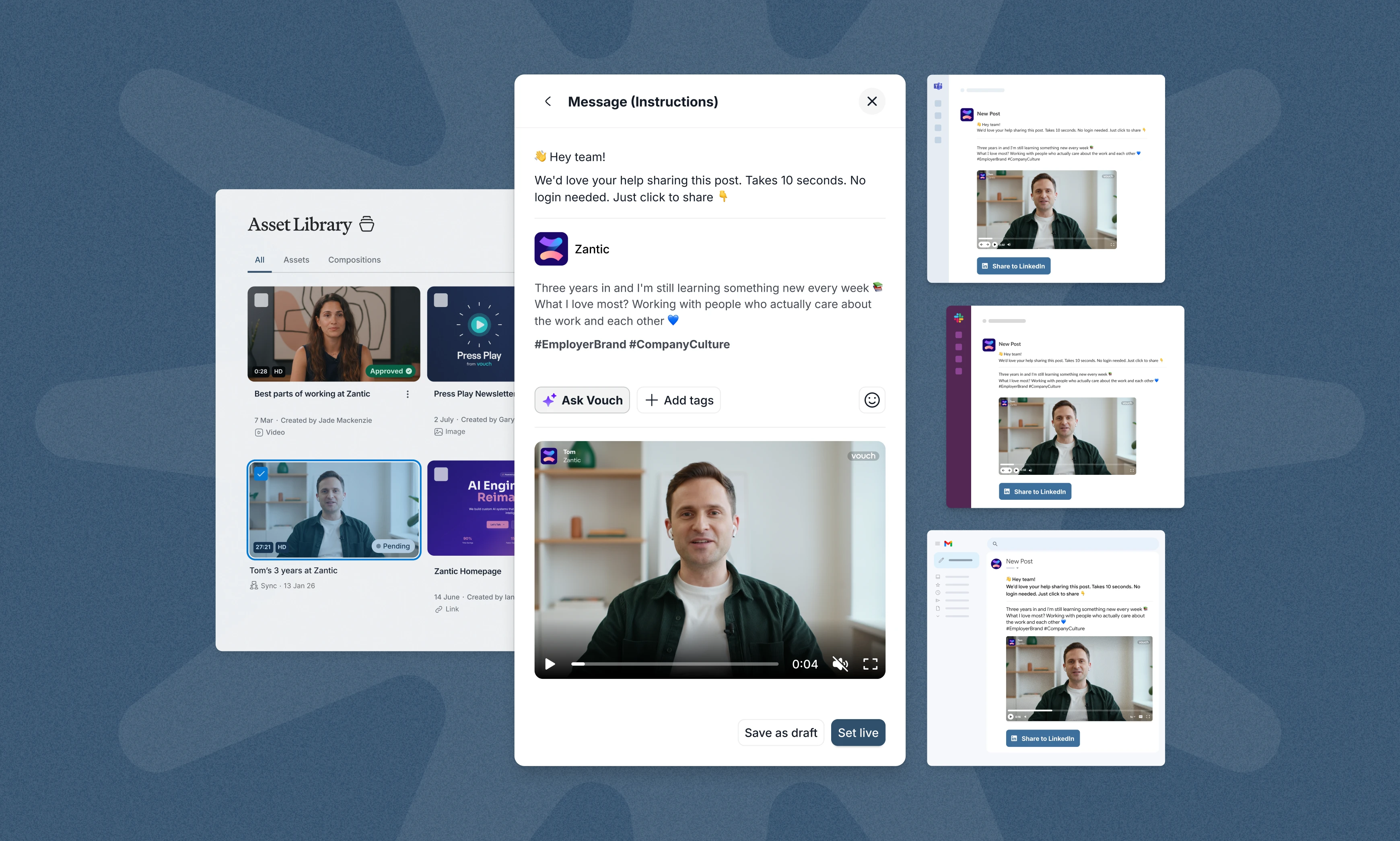
.png)

